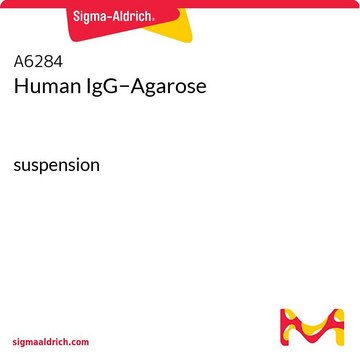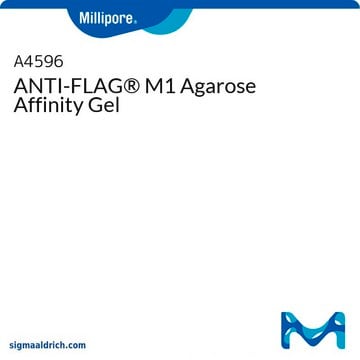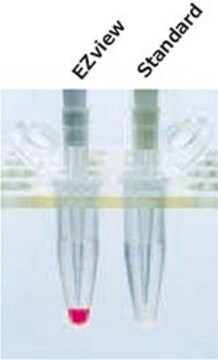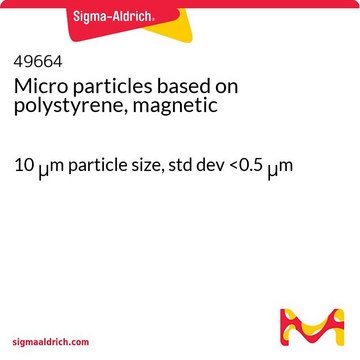A0919
Mouse IgG−Agarose
(Suspension in 0.5 M NaCl containing preservative.)
Synonym(s):
IgG-Agarose Beads
Sign Into View Organizational & Contract Pricing
All Photos(1)
About This Item
Recommended Products
conjugate
agarose conjugate
Quality Level
antibody form
purified immunoglobulin
form
(Suspension in 0.5 M NaCl containing preservative.)
extent of labeling
1 mg per mL
technique(s)
immunoprecipitation (IP): suitable
matrix
Cross-linked 4% beaded agarose
matrix activation
cyanogen bromide
matrix spacer
1 atom
storage temp.
2-8°C
General description
Immunoglobulin G (IgG) is a glycoprotein antibody that regulates immune responses such as phagocytosis and is also involved in the development of autoimmune diseases. Mouse IgGs have four distinct isotypes, namely, IgG1, IgG2a, IgG2b, and IgG3. IgG1 regulates complement fixation in mice.
Application
IgG-Agarose can be used as an immunoadsorbent. It can also be used to affinity purify antibodies, remove species specific cross-reacting antibodies or remove contaminating antibodies from an antiserum preparation. Typically cross-reacting antibodies may be removed from an antiserum preparation using an equal volume of IgGAgarose (resin volume). Mouse IgG-Agarose has been used for several immunoprecipitation assays,.
Mouse IgGs conjugated to agarose beads were used in immunoprecipitation assays to pre-clear HEK 293 whole cell extracts. Beads were incubated with extracts for 1 hour rotating at 4°C.
Physical form
Suspension in 0.5 M NaCl containing preservative.
Disclaimer
Unless otherwise stated in our catalog or other company documentation accompanying the product(s), our products are intended for research use only and are not to be used for any other purpose, which includes but is not limited to, unauthorized commercial uses, in vitro diagnostic uses, ex vivo or in vivo therapeutic uses or any type of consumption or application to humans or animals.
Storage Class Code
10 - Combustible liquids
WGK
WGK 3
Flash Point(F)
Not applicable
Flash Point(C)
Not applicable
Choose from one of the most recent versions:
Already Own This Product?
Find documentation for the products that you have recently purchased in the Document Library.
Customers Also Viewed
Identification of in vivo phosphorylation sites and their functional significance in the sodium iodide symporter.
Vadysirisack, D. et. Al
The Journal of Biological Chemistry, 282, 3620-3628 (2007)
CaMKII induces permeability transition through Drp1 phosphorylation during chronic β-AR stimulation.
Shangcheng Xu et al.
Nature communications, 7, 13189-13189 (2016-10-16)
Mitochondrial permeability transition pore (mPTP) is involved in cardiac dysfunction during chronic β-adrenergic receptor (β-AR) stimulation. The mechanism by which chronic β-AR stimulation leads to mPTP openings is elusive. Here, we show that chronic administration of isoproterenol (ISO) persistently increases
Veronica Cloud et al.
eLife, 8 (2019-07-28)
Atxn7, a subunit of SAGA chromatin remodeling complex, is subject to polyglutamine expansion at the amino terminus, causing spinocerebellar ataxia type 7 (SCA7), a progressive retinal and neurodegenerative disease. Within SAGA, the Atxn7 amino terminus anchors Non-stop, a deubiquitinase, to
Efthimia Lioliou et al.
PLoS genetics, 8(6), e1002782-e1002782 (2012-07-05)
RNA turnover plays an important role in both virulence and adaptation to stress in the Gram-positive human pathogen Staphylococcus aureus. However, the molecular players and mechanisms involved in these processes are poorly understood. Here, we explored the functions of S.
Chiang-Min Cheng et al.
Molecular and cellular biology, 31(5), 983-997 (2010-12-30)
Ras GTPases were long thought to function exclusively from the plasma membrane (PM). However, a current model suggests that Ras proteins can compartmentalize to regulate different functions, and an oncogenic H-Ras mutant that is restricted to the endomembrane can still
Our team of scientists has experience in all areas of research including Life Science, Material Science, Chemical Synthesis, Chromatography, Analytical and many others.
Contact Technical Service













